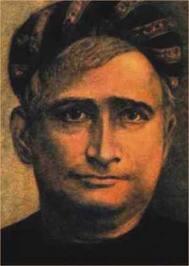Vande Mataram (IAST: Vande Mātaram, also pronounced Bande Mataram; transl. Mother, I bow to thee) is a poem written in Sanskrit by Bankim Chandra Chatterjee in 1870s, which he included in his 1882 Bengali novel Anandamath.[1][2] The poem was first sung by Rabindranath Tagore in the 1896 session of the Indian National Congress.[1][3] The first two verses of the song were adopted as the National Song of India in October 1937 by the Congress Working Committee prior to the end of colonial rule in August 1947.[4][5][6]
An ode to the Motherland, it was written in Bengali script in the novel Anandmath.[7] The title 'Vande Mataram' means "I bow to thee, Mother".[3][8] The "mother goddess" in later verses of the song has been interpreted as the motherland of the people –– Banga Mata (Mother Bengal)[9][10][11][12] and Bharat Mata (Mother India),[13][14] though the text does not mention this explicitly.
It played a vital role in the Indian independence movement, first sung in a political context by Rabindranath Tagore at the 1896 session of the Indian National Congress.[15] It became a popular marching song for political activism and Indian freedom movement in 1905.[3] Spiritual Indian nationalist and philosopher Sri Aurobindo referred it as "National Anthem of Bengal".[16] The song and the novel containing it was banned by the colonial government, but workers and the general public defied the ban (with many being imprisoned repeatedly for singing it in public); with the ban being overturned by the Indian government after the country gained independence from colonial rule in 1947.[17][18]
On 24 January 1950, the Constituent Assembly of India has adopted "Vande Mataram" as national song. On the occasion, the first President of India, Rajendra Prasad stated that the song should be honoured equally with the national anthem of India, "Jana Gana Mana".[19] However the Constitution of India does not have any mention of "national song".[20][21]
The first two verses of the song are an abstract reference to mother and motherland, they do not mention any Hindu deity by name, unlike later verses that do mention goddesses such as Durga.[22][23] There is no time limit or circumstantial specification for the rendition of this song unlike the national anthem "Jana Gana Mana" that specifies 52 seconds.[24]
Etymology[edit]
The root of the Sanskrit word Vande is Vand, which appears in Rigveda and other Vedic texts.[25][note 1] According to Monier Monier-Williams, depending on the context, vand means "to worship, to praise, celebrate, laud, extol, to show honour, do homage, salute respectfully", or "deferentially, venerate, worship, adore", or "to offer anything respectfully to".[25][26] The word Mātaram has Indo-European roots in mātár- (Sanskrit), méter (Greek), mâter (Latin) which mean "mother".[27][28]
Lyrics of the Song[edit]
The first two verses of Vande Mataram adopted as the "National Song" read as follows:
| Bengali script[29] | Bengali phonemic transcription | Devanagari script | IAST transliteration[15][30] |
|---|---|---|---|
বন্দে মাতরম্৷ | Vônde matôrôm | वन्दे मातरम्। | vande mātaram |
| বন্দে মাতরম্ (Bengali Script) | Latin transliteration (IAST) | वन्दे मातरम् (Devanagari transliteration) |
|---|---|---|
Translation[edit]
The first translation of Bankim Chandra Chattopadhyay's novel Anandamath, including the poem Vande Mataram, into English was by Nares Chandra Sen-Gupta, with the fifth edition published in 1906 titled "The Abbey of Bliss".[31]
Here is the translation in prose of the above two stanzas rendered by Sri Aurobindo Ghosh. This has also been adopted by the Government of India's national portal.[15] The original Vande Mataram consists of six stanzas and the translation in prose for the complete poem by Shri Aurobindo appeared in Karmayogin, 20 November 1909.[32]
Apart from the above prose translation, Sri Aurobindo also translated Vande Mataram into a verse form known as Mother, I praise thee!.[33] Sri Aurobindo commented on his English translation of the poem that "It is difficult to translate the National Song of India into verse in another language owing to its unique union of sweetness, simple directness and high poetic force."[34]
Translation into other languages[edit]
Vande Mataram has inspired many Indian poets and has been translated into numerous Indian languages, such as Tamil, Telugu, Kannada,Odia, Malayalam, Assamese, Hindi, Marathi, Gujarati, Punjabi Urdu and others.[35][note 2]
Arif Mohammad Khan translated Vande Mataram in Urdu.[37] It can be read in Urdu (Devanagari script) as:
तस्लीमात, मां तस्लीमात
तू भरी है मीठे पानी से
फल फूलों की शादाबी से
दक्खिन की ठंडी हवाओं से
फसलों की सुहानी फिजाओं से
तस्लीमात, मां तस्लीमात
तेरी रातें रोशन चांद से
तेरी रौनक सब्ज-ए-फाम से
तेरी प्यार भरी मुस्कान है
तेरी मीठी बहुत जुबान है
तेरी बांहों में मेरी राहत है
तेरे कदमों में मेरी जन्नत है
तस्लीमात, मां तस्लीमात[







